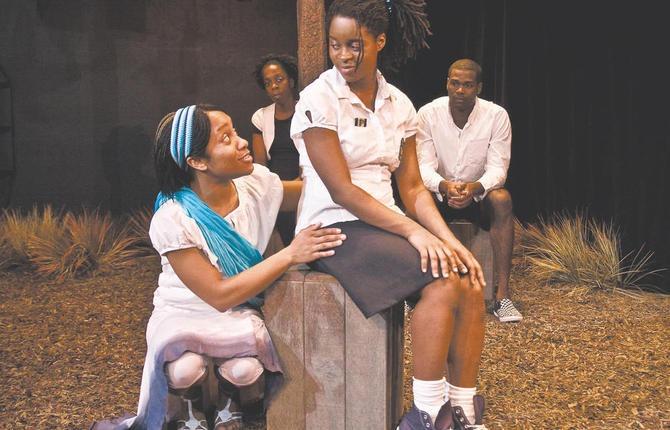
The Heaven Shop
(Theatre Direct/Tarragon) — Canadian author Deborah Ellis never holds back when it comes to telling stories of children living in difficult times in turbulent places. Her stories are hard to hear, but they should be told. This theatrical adaptation of her novel The Heaven Shop maintains this mandate. Binti, her father and two siblings live in Blantyre, Malawi, and the 13-year old has a coveted role on a radio drama called “Gogo’s Family” (Gogo means grandmother). But then Binti’s father falls sick and dies, and others tell her it was from AIDS (and her mother, now dead six years, had it too). Binti does not believe it, but the reality starts to sink in as she and her sister, Junie, are taken from their home and suffer mistreatment and prejudice by her uncle’s family. The two also lose touch with their brother Kwasi. Soon, the girls are kicked out of their relatives’ home and Binti finds herself alone, and she heads out to find her Gogo. Her grandmother welcomes her, but Binti has to suddenly cope with a very harsh life: hunger, sleeping on the floor, a long walk to fetch a heavy pail of water and, more importantly, the fact that she is an orphan like the multitude of children Gogo has taken in. The story is told by four young actors, and all except Jajube Mandiela —who plays Binti — take on a variety of roles (the three portray Gogo by speaking her lines together in unison). The action stops frequently and the four break into traditional song and dance. It’s a very successful technique: it gives the viewer a moment to digest what’s just happened and it brings the look and sound of Africa into the play. The subject matter may seem too harsh for kids, but we see it all through Binti’s innocent and optimistic eyes, and awful realities sink in slowly. The play’s only real flaw, in fact, is that Binti doesn’t show a great deal of sadness at the loss of her father, or seem to feel as profoundly as she should about the death and illness around her. A minor quibble in a 60-minute performance that moves well, has plenty of humour despite the subject matter, and tells a very powerful story that young people living in our privileged world really should hear. It’s running for a number of school performances throughout late February and early March and the two public shows are Saturday March 1 and 8 at 2:30. Tickets are $15 through the Tarragon’s box office at 416-531-1872.





